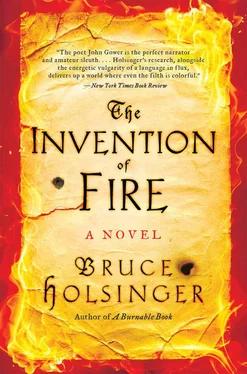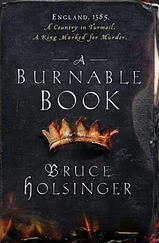Bruce Holsinger - The Invention of Fire
Здесь есть возможность читать онлайн «Bruce Holsinger - The Invention of Fire» — ознакомительный отрывок электронной книги совершенно бесплатно, а после прочтения отрывка купить полную версию. В некоторых случаях можно слушать аудио, скачать через торрент в формате fb2 и присутствует краткое содержание. Год выпуска: 2015, Издательство: HarperCollins, Жанр: Исторический детектив, на английском языке. Описание произведения, (предисловие) а так же отзывы посетителей доступны на портале библиотеки ЛибКат.
- Название:The Invention of Fire
- Автор:
- Издательство:HarperCollins
- Жанр:
- Год:2015
- ISBN:нет данных
- Рейтинг книги:3 / 5. Голосов: 1
-
Избранное:Добавить в избранное
- Отзывы:
-
Ваша оценка:
- 60
- 1
- 2
- 3
- 4
- 5
The Invention of Fire: краткое содержание, описание и аннотация
Предлагаем к чтению аннотацию, описание, краткое содержание или предисловие (зависит от того, что написал сам автор книги «The Invention of Fire»). Если вы не нашли необходимую информацию о книге — напишите в комментариях, мы постараемся отыскать её.
The Invention of Fire — читать онлайн ознакомительный отрывок
Ниже представлен текст книги, разбитый по страницам. Система сохранения места последней прочитанной страницы, позволяет с удобством читать онлайн бесплатно книгу «The Invention of Fire», без необходимости каждый раз заново искать на чём Вы остановились. Поставьте закладку, и сможете в любой момент перейти на страницу, на которой закончили чтение.
Интервал:
Закладка:
No one seemed to be following me as I left Southwark over the bridge and made my way into Aldgate Ward, a ward of metal and arms where smiths and founders busily crafted everything from plate and chain to grilles and bells. While the Tower employed many of its own workers in metal, the crown was jealous of the city’s talents in the arms-related trades, going so far as to forbid their guildsmen to cross the seas in the retinues of magnates. It was also illegal by statute to export iron goods from England, let alone arms and armor such as the handgonnes lifted by Simon at Dunkirk.
Yet this serpentine gun, or so Simon had told me, was the invention of a smith working for one of London’s many houses. An intricate and clever work of the hands, displaying a fine combination of delicacy, dexterity, and strength that only a master smith could be capable of forging. While metalworkers of all trades were required to stamp their mark on their productions, neither the gun nor the serpent bore the signs of their craftsmen-though forged marks were so common that such a sign would have meant little in any case.
Or so I thought. My intention had been to show the serpentine device to as many smiths, farriers, and founders in the precinct as necessary until someone recognized the work of the gunmaker. It was a considerable surprise when the first guildsman I consulted identified the maker immediately. He held the snake, turned it and felt it with the hands of an expert, then took a long squint at the patterned back of the serpent. A grudging smile. “That’s Marsh’s work, sure as I stand here.”
“Who is Marsh?”
“Stephen Marsh, over at Stone’s foundry.”
“How can you know?”
“Recognize his work with my smith’s eyes shut tight. But no need for that. See just there?” He pointed to a spot along the snake’s back. I took out my spectacles and examined the area in question. There, within the waffled pattern along the snake’s spine, the minute letters SM appeared between four of the cross hatchings.
“What is Marsh’s reputation among those of your craft?”
He shrugged. “When it comes to London metaling, Stephen Marsh is the best. Everyone knows it.” A corner of his mouth turned up. He snickered. “ ’Specially Stephen Marsh.”
“Where is his place of work?”
“Bellyeter Lane, off Fenchurch Street in Staining parish. But you won’t find Stephen Marsh there.”
“Oh?”
“Poor carl’s been in sanctuary at All Hallows Staining. Gossip is”-he leaned in, licked his lips-“he killed him a young lass up by Ware. The sheriffs and beadles been asking around for him, but he churched himself before an arrest, won’t answer their questions. I worry for the widow.” At my questioning look he said, “Hawisia Stone, the mistress at that house, and Stephen Marsh’s mistress as well. The master passed this winter last.” He shook his head. “Without Marsh’s hammer it’s passing hard to see Stone’s staying afloat.”
I considered the news about Marsh as I took the short walk down through the parish of All Hallows Staining. Another life taken, another thread pulled. How many more could there be to unravel?
The parson of Staining, young and new to the parish, stood on the western porch, haggling with a trio of carpenters over an internal repair. When they had trudged off he looked at me disdainfully. “Yes?” he said, taking in my poor raiment.
“You give sanctuary, Father?”
He sniffed. “Only to members of this parish. You are a stranger here. I have never seen your face, now, have I?”
“Not likely,” I said. He wore a gilded belt about his waist, his pointed and stylish shoes cut of the softest leather. A parson who favored finery. I cupped my purse in my hand, absently squeezed the gold and silver. His gaze went to my waist.
“What do you want?”
“Stephen Marsh. He is taking sanctuary here?”
The priest hesitated. “Stephen has committed a grievous and mortal sin. His crime is between himself and God, with no call for meddlers.”
“Truly?” I said.
His head cocked to the side as he listened to the soft clink of mingled coins.
“Only a word with him, Father.”
He parted his lips, eyes still on my purse. “He has left sanctuary.”
“Where did he go? Back to Stone’s?”
His eyebrows lifted expectantly as his hand came out. I dug for a coin.
“Not Stone’s,” the priest said once the gold was in his palm. “He’s gone to the Tower. They came for him days ago.”
“Who?”
“The king’s armorer himself. William Snell.”
It took little time to locate Stone’s foundry midway down Bellyeter Lane, a quiet byway off Fenchurch Street. A colorful awning, a sign displaying the foundry’s lozenge-shaped stamp, a low bench set back from the side gutter. Though the display room was open to the street no one was there. I walked through to the yard. The space was well kept, with neat piles of wood and coals stacked along the north spans of the barn and smithy. Several square chimneys rose from two of the three roofs, though only one was smoking at that hour. Like the street in front the yard was relatively quiet, the only sounds coming from the direction of the foundry. As I crossed the yard I heard a woman’s voice from within.
“More water on that side, Walter. And Hob, not so flat on the curve or you’ll be through to the bricks. Now then, both of you. Step back and look at the shape you’ve made. Time for the striping, do you suppose?”
The woman I took to be Hawisia Stone, large with child, stood near a wide pile of brown clay, directing two apprentices in the shaping of a bell mold. Though dressed in widow’s black she was hardly still with grief. Unconfined, animated, alive with the work, strands of loose hair swishing this way and that as her head went back and forth and her mouth barked commands. Even so her face looked pale and drained of blood, her eyes hooded and smudged.
“Mistress Stone,” I said during one of the rare pauses in her discourse.
Her head swung in my direction. She reached up to wipe a patch of sweat from her brow. When her arm came down I could see that half her sleeve was covered in a dark patch of moisture. “Yes? What?” she said.
“May I have a word?”
“You’ve a commission for Stone’s?” she replied dubiously, with a glance at my clothing.
“I don’t, I am afraid.”
She glared at me. “I have but a moment for you then. We’ve bells to pour.” Her voice was weary and low yet sharp. She led me out to the yard. One of the foundry’s cats approached to sniff around my feet. She nudged the animal away with her shoe.
“What is it then?” She folded her arms over her womb.
“I am here about Stephen Marsh,” I said.
She raised her eyebrows in mock surprise. “Well, now there’s a rare thing. What about him?”
“Have you spoken with him in the last several days?”
“And what if I have?” She took a step back, looked me up and down. “You’re not a beadle’s man, not of this ward at all rates. You’re with the new sheriffs, are you?”
“My name is John Gower,” I said, sorting my thoughts. Here was Hawisia Stone, mistress of a shop that had recently lost its master and risked losing its most talented guildsman. A woman of significant means, heavy with her affliction yet resisting confinement prior to the birth. Instead she was out in the foundry with the boys and men, working them and herself to keep the shop alive despite her weakened condition. She needed help.
“I work alone, Mistress Stone,” I said. “Yet I may well be able to help Stephen out of his predicament. Perhaps restore him to your shop. Not a promise, you understand, but a possibility, however faint.”
Читать дальшеИнтервал:
Закладка:
Похожие книги на «The Invention of Fire»
Представляем Вашему вниманию похожие книги на «The Invention of Fire» списком для выбора. Мы отобрали схожую по названию и смыслу литературу в надежде предоставить читателям больше вариантов отыскать новые, интересные, ещё непрочитанные произведения.
Обсуждение, отзывы о книге «The Invention of Fire» и просто собственные мнения читателей. Оставьте ваши комментарии, напишите, что Вы думаете о произведении, его смысле или главных героях. Укажите что конкретно понравилось, а что нет, и почему Вы так считаете.












